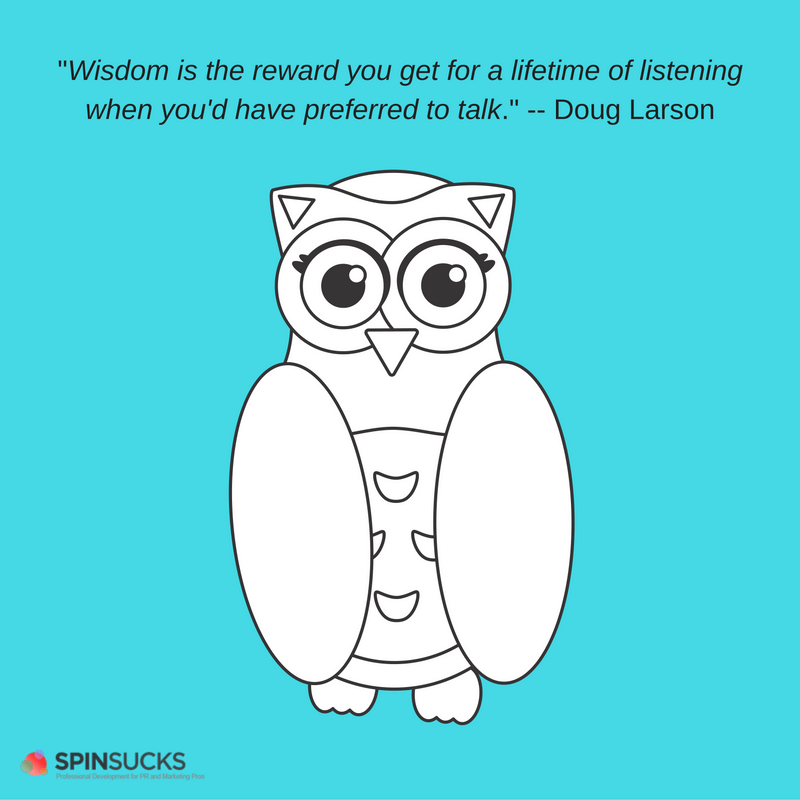 If this presidential election has taught us anything, it’s that people do If this presidential election has taught us anything, it’s that people do not effectively listen.
If this presidential election has taught us anything, it’s that people do If this presidential election has taught us anything, it’s that people do not effectively listen.
At all.
I mean, Trump interrupted Clinton 51 times in 90 minutes in the first debate.
My hair dresser, whom I adore almost more than life itself, said to me, “Do you (women) really get interrupted that often?”
Yep. We do.
(He was mortified, by-the-way.)
And it’s not just in business.
It’s sitting around a dinner table with family, or hanging out at a ball game, or having a debate with friends.
We are constantly interrupted.
In most cases, it’s not malicious. And then, sometimes, it is.
I’ve sat in client meetings where the CEO has completely talked over his marketing or communications team (typically all female) without listening to their ideas.
Once I had a client continue to interrupt me with, “Just don’t screw this up. I don’t care. Just don’t screw up.”
Guess who was then motivated to screw up?
(And I might have even said that…and let’s just say he’s no longer a client.)
You are Brilliant!
Our very simple new business strategy around these parts is this: Ask smart questions and shut up.
I am dead serious when I tell you, if you do that, the prospect will think you brilliant.
You asked questions and you let the person talk…you did no talking, yet you’re the brilliant one.
Why is this?
People LOVE to hear themselves talk.
If you provide an environment for them to do that, I am willing to bet you will win 80 percent of every new business opportunity (assuming it’s the right fit for you, too).
Don’t interrupt. Don’t talk over them. Don’t even ask a question while they’re finishing their answer to the previous one (this happens a lot, too).
Just shut up, listen, and take lots of notes.
It’s not easy to do (see above re: we all like to hear ourselves talk), but it’s an extremely effective strategy.
Six Ways to Effectively Listen
Here are six ways to effectively listen and walk away with a reputation for being brilliant and, quite possibly, a new client or customer.
- Pay attention and take notes. You are not listening to respond. In many cases, you may not know what you’re going to ask next, simply because you are in learning mode. If they’ve said something that conjures a question, jot it down to come back to later.
- Show you’re actually listening. The note-taking will prove it if you’re in person, but if you’re on the phone, make sure you include small verbal cues (yes, I see, ohhhh, ah ha).
- Effectively listen to the words the person is saying. Yesterday, I did a three-hour workshop at a conference and, rather than use slides, I used a white board and flip chart. At the end, one of the attendees asked if she could take photos. I said she could, but that I was going to send her professionalized versions of what I had written or drawn. She said, “Yes, but with the photos of these charts, I can picture what you’re saying.” Do the same thing when you’re listening…picture what they’re saying and perhaps even doodle in your notebook to illustrate what you’re hearing.
- Do not interrupt. Ever. This goes for imposing your solutions, as well. Particularly in a new business meeting, you may want to say, “We can totally help you solve that with this product or service.” Refrain from doing so, even if it’s true. This puts the person on the defensive and makes them feel like you think you’re more important than they are.
- Ask questions that allow the other person to explain. This is where statements such as, “What I heard you say is X” work really well. It allows you to show you were listening and that you understand their needs, challenges, or issues.
- Pay attention to the non-verbal communication. This is more difficult if you’re on the phone, but pay attention to the body language from the other person. Are their arms crossed or are they more relaxed? Both ways of sitting will give you great insight into the person’s willingness to be talking with you. In some cases, they may have orders from their boss to meet with you, but they have zero intention on working with you. Ever. Adjust your line of questioning to get them to open up and trust you…and to change their minds.
I’d love to hear from you if you try effectively listening in your next business meeting, particularly if it’s with a prospect and you’re in information-gathering mode.
I’m willing to bet they will think you’re the smartest communicator they’ve ever met.